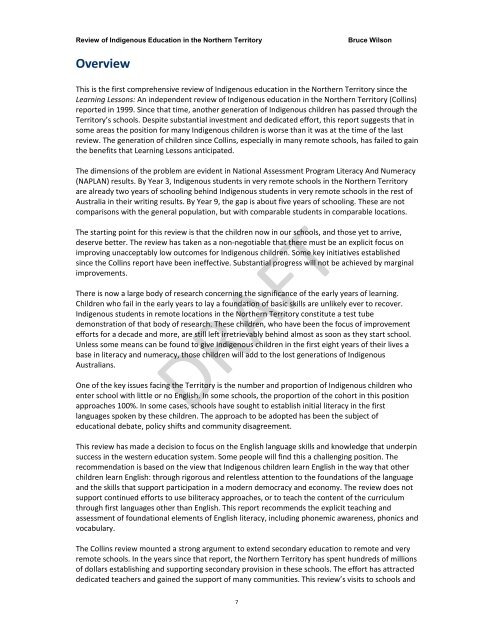Indigenous-Education-Review_DRAFT
Indigenous-Education-Review_DRAFT
Indigenous-Education-Review_DRAFT
Create successful ePaper yourself
Turn your PDF publications into a flip-book with our unique Google optimized e-Paper software.
<strong>Review</strong> of <strong>Indigenous</strong> <strong>Education</strong> in the Northern Territory<br />
Bruce Wilson<br />
Overview<br />
This is the first comprehensive review of <strong>Indigenous</strong> education in the Northern Territory since the<br />
Learning Lessons: An independent review of <strong>Indigenous</strong> education in the Northern Territory (Collins)<br />
reported in 1999. Since that time, another generation of <strong>Indigenous</strong> children has passed through the<br />
Territory’s schools. Despite substantial investment and dedicated effort, this report suggests that in<br />
some areas the position for many <strong>Indigenous</strong> children is worse than it was at the time of the last<br />
review. The generation of children since Collins, especially in many remote schools, has failed to gain<br />
the benefits that Learning Lessons anticipated.<br />
The dimensions of the problem are evident in National Assessment Program Literacy And Numeracy<br />
(NAPLAN) results. By Year 3, <strong>Indigenous</strong> students in very remote schools in the Northern Territory<br />
are already two years of schooling behind <strong>Indigenous</strong> students in very remote schools in the rest of<br />
Australia in their writing results. By Year 9, the gap is about five years of schooling. These are not<br />
comparisons with the general population, but with comparable students in comparable locations.<br />
The starting point for this review is that the children now in our schools, and those yet to arrive,<br />
deserve better. The review has taken as a non‐negotiable that there must be an explicit focus on<br />
improving unacceptably low outcomes for <strong>Indigenous</strong> children. Some key initiatives established<br />
since the Collins report have been ineffective. Substantial progress will not be achieved by marginal<br />
improvements.<br />
There is now a large body of research concerning the significance of the early years of learning.<br />
Children who fail in the early years to lay a foundation of basic skills are unlikely ever to recover.<br />
<strong>Indigenous</strong> students in remote locations in the Northern Territory constitute a test tube<br />
demonstration of that body of research. These children, who have been the focus of improvement<br />
efforts for a decade and more, are still left irretrievably behind almost as soon as they start school.<br />
Unless some means can be found to give <strong>Indigenous</strong> children in the first eight years of their lives a<br />
base in literacy and numeracy, those children will add to the lost generations of <strong>Indigenous</strong><br />
Australians.<br />
<strong>DRAFT</strong><br />
One of the key issues facing the Territory is the number and proportion of <strong>Indigenous</strong> children who<br />
enter school with little or no English. In some schools, the proportion of the cohort in this position<br />
approaches 100%. In some cases, schools have sought to establish initial literacy in the first<br />
languages spoken by these children. The approach to be adopted has been the subject of<br />
educational debate, policy shifts and community disagreement.<br />
This review has made a decision to focus on the English language skills and knowledge that underpin<br />
success in the western education system. Some people will find this a challenging position. The<br />
recommendation is based on the view that <strong>Indigenous</strong> children learn English in the way that other<br />
children learn English: through rigorous and relentless attention to the foundations of the language<br />
and the skills that support participation in a modern democracy and economy. The review does not<br />
support continued efforts to use biliteracy approaches, or to teach the content of the curriculum<br />
through first languages other than English. This report recommends the explicit teaching and<br />
assessment of foundational elements of English literacy, including phonemic awareness, phonics and<br />
vocabulary.<br />
The Collins review mounted a strong argument to extend secondary education to remote and very<br />
remote schools. In the years since that report, the Northern Territory has spent hundreds of millions<br />
of dollars establishing and supporting secondary provision in these schools. The effort has attracted<br />
dedicated teachers and gained the support of many communities. This review’s visits to schools and<br />
7


